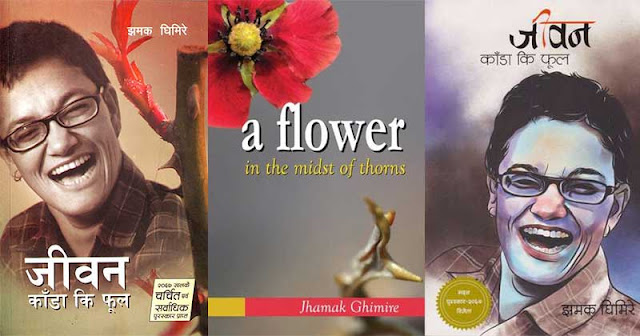HEMJA POTATO FESTIVAL
 |
| The farmers in fancy dress up getting ready to entertain the public. Photo: Organizer |
By LB THAPA
At a time when Nepali youths look for foreign employment as the only way to uplift their living standard, many people have stayed back home and turned to farm. After having toiled on foreign soil, some youths have learned a lesson that the amount of money they earn abroad can also be earned at home.
The recent 8th Hemja Potato Festival-2017 has been an excellent example of farming success. There are over 400 houses, which are professionally involved in vegetable farming in Hemja. The interesting thing is that many youths in this village who previously worked abroad but now are full-time vegetable farmers.
Meet Rishiraj Timilsina, a local man who had spent over five years abroad, now he is a full-time vegetable grower. “I had spent nearly seven years abroad. I had to work hard to earn a few bucks and on top, there was no respect for immigrants. Then I decided to leave abroad to my hometown Hemja. Now I am a full-time vegetable grower and earn better than abroad”, said Rishiraj Timilsina proudly.
This is the 8th Potato Festival and it is gaining more popularity every passing year. Many men and women throng in the festival and carry bags full of potatoes. The farmers of Hemja have proved that they are capable of carving a niche in vegetable production. Until a few years ago, Hemja was an unknown village, which grew vegetables that were even insufficient for the local people. However, today the face of the Hemja village has completely been transformed.
The local people of Hemja give credit to Lal Bahadur Thapa for his persistent effort to bring the Annapurna canal project to Hemja. Annapurna canal was built in 1981, which became the lifeline of Hemja farmers and vegetable growers. The canal meanders through the entire fertile region of Hemja and supplies water to produce enough vegetables. However, in recent times the canal is damaged in many places and needed urgent repair.
“The people of Hemja are heartily grateful to JICA for issuing 20 million rupees for repairing the Annapurna canal. Actually, the condition of the canal is very bad as it is broken in many places. Soil erosion and landslides have largely damaged the canal. We wanted to rebuild the entire length of the canal but it was not possible. The JICA has agreed to repair the canal and we are still happy about that”, said Timilsina.
 |
| Photo: Organizer |
 |
| Photo: Organizer |
 |
| Photo: LB Thapa |
 |
| Photo: Organizer |
 |
| Photo: LB Thapa |
A decade ago, Hemjali people were not involved in professional vegetable farming. They would grow vegetables for their personal consumption only. However, a local farmer, Dharmaraj Thapa, was the man who encouraged the local people to grow vegetables on a commercial level. Under his leadership, the first Potato Festival was organized in 2010. The first Potato Festival was unique in the sense that everyone at the festival was surprised at seeing mountains of potatoes in one place. No one had ever seen so much potato in front of their eyes. The news of the Potato festival spread and soon Nepali and foreign visitors began thronging in the Potato festival to see and purchase potatoes.
The farmers of Hemja village have proved that how vegetable production can be a very lucrative profession. These farmers produce varieties of seasonal vegetables and sell them locally. Now Hemja village has earned a big reputation for growing quality potatoes, which are famous in the country for their taste and unique flavor. Nowadays the potatoes of Hemja have become so popular in the region that many people catch buses or drive their personal vehicles to Hemja and buy potatoes.
"These potatoes are very tasty and they are available in various shapes and sizes. I regularly buy potatoes in every Mahotsava. This is an opportunity to buy potatoes at a cheaper price. At present the market price of potatoes is per kilo 80-90 rupees, whereas you can buy the best quality potatoes at only 32 rupees per kilo" said Diwakar Bhattarai, a jubilant consumer.
Annually Hemja produces over 1500 tons of potatoes in 250 hectares of land. Potatoes such as Kufri Jyoti, Khumal seto, Khumal Laxmi, Janak Dev and MS-42 are grown in Hemja. However, the majority of Hemja farmers grow MS-42. “Around 80% Hemja farmers’ first choice is to grow MS-42 potatoes. Most of the consumers demand MS-42 potatoes. They are delicious and easy to cook. On top, this kind of potatoes is easy to grow and the return is always more than other potatoes”, said Jairam Timilsina, coordinator of the 8th Potato Festival Hemja.
Nepali climate is suitable for certain species of potatoes. For instance, Kufri Jyoti (High and mid-hills), Kufri Sindhuri (Terai and inner Terai), Desiree (Hills and Terai), Janak Dev (High and mid-hills), Khumal Rato (Terai and inner Terai), Khumal Seto-1 (High and mid-hills), Khumal Laxmi (Terai to high hills), IPY 8 (Terai to mid-hills). There are some places in the country where more potatoes are grown compared to the other places. For instance, Jhapa, Bara, Kavre, Saptari, Morang, Makawanpur, Rupandehi, Panchthar, Ilam, and Sunsari are the 10 leading potatoes producing districts, accounting for more than 40 percent of the total output across the country.
According to the vegetable farmers in Hemja, their potatoes are mostly attacked by late blight, black scurf, wart, scabs, and virus diseases. “Time to time agricultural experts from Regional Agricultural Research Station (RARS), Lumle come to Hemja and give us training. They teach us how to identify diseases on various vegetables and subsequently use pesticides if necessary. However, in order to avoid possible diseases in vegetables, we always follow a rotation system. This is a much easier way to bypass all kinds of diseases found in vegetables,” said Timilsina.
 |
| Photo: LB Thapa |
 |
| Photo: Organizer |
 |
| Photo: Organizer |
"Over the years the annual turnover of potatoes has increased significantly, but not the market. This is a very serious problem for many farmers in Hemja. The government must give an assurance to buy excess potatoes. However, there is no such assurance from the government side. Such lackluster attitude of the government subsidies to vegetable growers’ enthusiasm for growing more vegetables," complained Timilsina.
It is noted that in order to increase potato production in the country, a Swiss project was involved since 1960. This project did help Nepali farmers in the mid-hills and high hills of Nepal to store standard potato seeds in rustic stores at 6,000 ft. This Swiss aide enabled Nepali farmers not to depend on the Indian supply of quality seeds. This was truly a triumphant achievement in itself. The project took a major step forward and established rustic stores in Ilam, Letang Morang, Sunsari, Panchthar, Dolakha, Kaski, and Surkhet. The project does also teaches the farmers for storing quality seeds to ensure the next generation of fine potatoes.
If we go by the statistics provided by the Ministry of Agriculture and Co-operatives, (MoAC) the production of potatoes went up to 2.05 million tons in 2007/08 from 0.74 million tons in 1993/94. Not only had this but potato crop acreage and productivity rose by 75 percent and 57 percent over the period. In fact, much has been done to increase the production of potatoes. However, the production of potatoes has not increased as much as was expected.
Nepali farmers are facing several problems. Lack of improved seeds, shortage of cold storage, lack of training, and perennial attacks by pests is a few to name. In the meantime, the government should make adequate arrangements to purchase farmers’ produce and sell them at home. Until now, Nepal does import tons of vegetables from India. Nepal must end this dependency on India for vegetables. Nepali soil can produce vegetables, which will be more than enough for the Nepalese. This is possible if the government takes this issue with serious attention. The success of vegetable farming will also pull many youths who are toiling under scorching sunlight in the Gulf countries. Making a successful living at home is always better than getting humiliated abroad.
The harsh reality is that whether the apples of Jomsom or potatoes of Hemja excess amount of production has failed to find a market at home and abroad. It is all due to the government's apathy, say the farmers. It seems that our lawmakers are more worried in thinking of how to stay longer in the power than paying attention to the problems that common people are facing in the country. Let's not forget that unless and until our government comes to its senses, Nepal's all-around agricultural development is never possible. At the same time, we must not forget that we cannot dream of industrial development without a fully grown-up agriculture sector.
 |
| LB Thapa is a Pokhara-based freelance writer and author. |
LEGAL
WARNING
All rights reserved. No articles and photos published in this blog can be reproduced without the prior written permission of the author. Legal action will be taken immediately if any articles or photos are reproduced without the author’s knowledge. However, articles or photos can only be reproduced by duly mentioning the author’s name and the blog's name (read2bhappy.blogspot.com). The author must be informed by sending an email. All articles and the photos published in this blog are the copyright property of LB THAPA.









.png)
Comments
Post a Comment